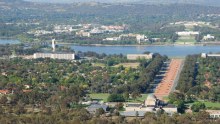Malcolm Turnbull 'moves on' from 18C, but at what cost?
Posted
On Monday, the full ministry met at 6:30pm.
The Prime Minister, Malcolm Turnbull, addressed his front bench. His main messages were, at first, familiar enough.
He referenced the WA election, a crushing blow to the state Liberals, saying the lesson from it was that people were focused on jobs and energy.
And this is where it got interesting, or at least where Mr Turnbull's meaning was largely missed or misread by most of his colleagues. That is, those who weren't already in on the fix.
The PM said voters were not interested in constant debate about same-sex marriage and the debate about Section 18C of the Racial Discrimination Act.
The Government had to "move on" from these subjects, Mr Turnbull told ministers.
With that, there was no more conversation about 18C, even though there had been murmurings around the building earlier in the afternoon that the Government was up to something.
On hearing the PM speak, some ministers assumed that the murmurings were untrue and that by "move on" Mr Turnbull meant that the Government should not be distracted from its main mission on jobs, economy and growth.
After all, Mr Turnbull had repeatedly told Australians he had no plans to change 18C.
Little did they know that Mr Turnbull and Attorney-General George Brandis had a bill on 18C in their back pockets. Neither mentioned it and some ministers remain curious and a bit miffed by this deliberate omission.
Because at the Cabinet meeting which immediately followed the full ministry meeting, a comprehensive proposal was brought out, discussed and ticked off.
The relevant backbench committee was urgently convened in preparation for the partyroom meeting the next morning.
It turns out, that by "move on" the PM had meant taking a stand on the issue and seeking resolution of the matter in Parliament.
If Parliament rejected the proposal, so be it. Move on.
Even some senior moderates — those less inclined to listen to the "wet behind the ears IPA types", as one Liberal described the "18C obsessives" — are resigned to this tactic, provided the changes were firmly and fiercely presented as a tightening of race hate laws and not a watering down.
Which is what the PM sought to do when he announced his plan to replace the words "offend, insult, humiliate" with the word "harass".
"We are announcing changes to the Racial Discrimination Act and the Human Rights Commission legislation, which will strengthen the protection of Australians from racial vilification and strengthen the protection of free speech, one of the fundamental freedoms upon which our democracy depends," he said.
It wasn't entirely convincing.
18C debate about tackling the 'PC brigade'
Does the Government think the changes to 18C will pass Parliament? Not really.
But there is a very good chance the Government will be able to improve the complaints handling by the Human Rights Commission — Ian Goodenough's joint parliamentary committee on human rights may not have reached any useful recommendations on the wording of 18C, but it did expose the problems in the HRC's opaque and slow process.
Not that these changes would be any consolation for Liberal MPs warning of a backlash from ethnic communities.
NSW Liberal MP Craig Laundy, a moderate in one of the Coalition's most multicultural seats, asked Senator Brandis in Tuesday's partyroom meeting whether the two high-profile 18C complaints against Queensland University of Technology students students and the late cartoonist cartoonist Bill Leak could have been dispatched sooner with changes to the process.
Those listening to the Attorney-General believe his answer, though typically florid and at times impenetrably legalistic, boiled down to two words: "Yes, probably".
But that's not what this debate is about for the Liberal Party.
South Australian MP Rowan Ramsey summed it up for many of his colleagues this way: he was no lawyer, but if it was the first step forward in tackling political correctness, he was all for it.
For some Liberals, the debate about Section 18C has come to represent more than an intrusive codifying of racial discrimination.
It has become the chief rallying point for Liberals demanding a restatement of core principle against the "PC brigade".
And this has become part and parcel of Malcolm Turnbull's difficult predicament.
As a moderate leader of a party fractured by the tumult of Tony Abbott's downfall, the PM was being tormented by demands that he demonstrate his institutional obligations to the conservative Liberal membership by being enlisted to their culture war.
But having relented to the conservatives and the libertarian zealots, the PM must now pray that the price of placating them is worth it.
Or indeed whether his statement of principle on 18C will satisfy his doubters and whether he can truly "move on" if the Senate knocks back the proposed rewording of the Act.
Here's the rub.
Those Liberals who had wanted no more than process changes to 18C complaints handling and the insertion of a "reasonable person test" reckon defeat in the Senate will not be the end of it.
They fear the conservatives, having been fed red meat, will be hungry for more.
Topics: federal-government, federal-parliament, liberals, race-relations, law-crime-and-justice, turnbull-malcolm, australia












